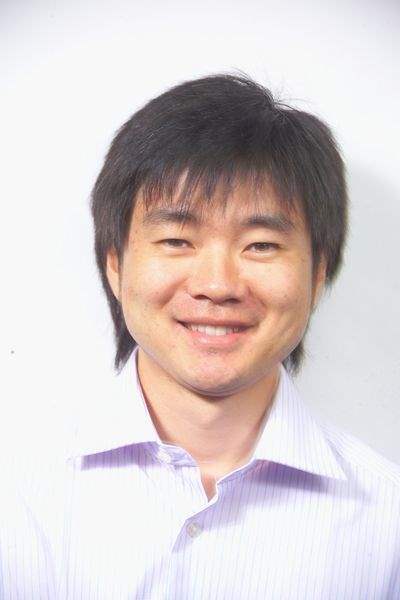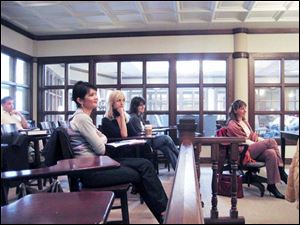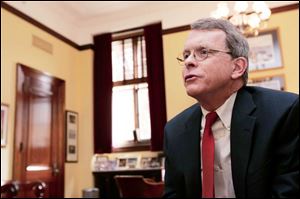
Push to curb 'earmarks' imperils effort to aid young democracies
4/1/2007
Khvan
John A. Holinka / Jose Nogueras

Dilrabo Djurakulova, Tamar Vashakidze, and Rusudan Tabatadze, from left, are enrolled at Ohio Northern University in a full-scholarship program made possible by a $700,000 federal earmark introduced by former Sen. Mike DeWine.
WASHINGTON - Olive-skinned with thick sable hair, Dilrabo Djurakulova embodies the history of her native Uzbekistan, where Arabs, Asians, and Europeans traded along the fabled Silk Road connecting East and West.
She left a small Uzbek town last year for Ohio Northern University, in Ada, Ohio, enrolling in a full-scholarship federal program that teaches lawyers how to bridle corruption in former Soviet republics.
Along with her classmates, Ms. Djurakulova recently attended a champagne-and-shrimp reception hosted by the university's Washington lobbyist, a celebration of the program's lessons and evidence of the uncertain future of its funding.
"In my country, it's very difficult to go into important buildings," said Ms. Djurakulova, reflecting on her day at the U.S. Capitol. "We don't have the feeling that government is our servant. We have the feeling that government is our master. Here, everything is different."
A $700,000 federal earmark introduced by former Ohio Sen. Mike DeWine last year established the program, an attempt to instill the principles of democracy in countries near hotbeds of anti-American sentiment such as Iran and Afghanistan.

Khvan
But earmarks have become controversial, particularly among the new Democratic majority, which ousted Republicans, including Mr. DeWine, in the 2006 election.
"The corrupt earmark process of the last five years has changed," said Sen. Sherrod Brown, who unseated Mr. DeWine. "There's not going to be the money to hand out to thousands of groups."
Associated with a $223 million "bridge to nowhere" in Alaska and the eradication of brown tree snakes in Guam, earmarks came to epitomize government boondoggles.
Mr. Brown said he would prefer funding programs through appropriations to agencies and publicly available grants instead of earmarks.
Last month, the Office of Management and Budget started publishing a limited database of what were largely undocumented earmarks. In fiscal 2005 alone, the government spent $14.26 billion on 12,034 earmarks, half of which involved the departments of Transportation and Defense.
Earmarks have fallen off since Republicans failed to renew many of them after losing the House and the Senate, putting programs such as ONU's into financial limbo as a consequence.

Mike DeWine, says he OK d roughly two earmarks for every hundred presented to him.
Current appropriations give the State Department enough funding to maintain its educational and cultural initiatives, yet - without an earmark - there is no legislative order that the government continue to pay for ONU's program, said Howard Fenton, director of the ONU program and an expert in international development.
Mr. Fenton said he is "cautiously optimistic" the State Department would provide the funds to bring a second class of foreign students to the university's rural campus in Hancock County just south of Findlay and 70 miles south of Toledo.
"If you use the term earmark as a pejorative, it connotes waste and abuse of the process, you lose sight of the fact that most of the earmarks are substantial and meritorious programs," Mr. Fenton said.
Mr. DeWine said he approved roughly two earmarks for every hundred presented to him, explaining that legislators can often recognize the value of programs that isolated bureaucrats would overlook.
The ONU program appealed to Mr. DeWine because it exported vital American ideas to formative nations, places his own constituency might be familiar with only through the satirical film Borat: Cultural Learnings of America for Make Benefit Glorious Nation of Kazakhstan.
"You'd find the indicators of democracy lag far, far behind the mere holding of an election," Mr. DeWine said. "What is the real heavy lifting is protecting property rights so there is investment, making sure that someone accused of a crime has a trial."
Earmarks date to 1817, when Rep. John Calhoun (D., South Carolina) advocated constructing a highway system into America's western frontier by approving federal funds for specific local projects.
They accelerated in popularity and absurdity after the Republicans gained control of the legislative branch in 1994, according to the Americans for Prosperity Foundation, a taxpayer watchdog group.
"What is the proper role of the federal government?" asked Ed Frank, vice president of public affairs at Americans for Prosperity. "I don't think that when our founding fathers came together, they said we need a national government to pay for city parks."
Critics deride earmarks as covert tools for congressmen to reward campaign donors and friends, an abusive expansion of government power into realms fit for local governments and private companies.
According to the Sunlight Foundation, an organization seeking more government transparency, former House Speaker Dennis Hastert (R., Ill.) and Rep. Alan Mollohan (D., W.Va.) personally benefited from earmarks they wrote, allegations both dismissed as partisan smears.
That such a vilified funding mechanism could be the basis for America instructing a small part of the world about corruption reinforces what ONU student Yuri Khvan, an affable Kyrgyzstan native, learned from studying case law.
Sitting on a couch with the university's lobbyist, surrounded by tuxedoed waiters holding hors d'oeuvres, Mr. Khvan said, "Even here, it's not so perfect."
Contact Joshua Boak at:
jboak@theblade.com
or 419-724-6728.